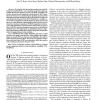21 search results - page 4 / 5 » Multicast Congestion Control with Distrusted Receivers |
141
Voted
PROMS
2001
Springer
15 years 6 months ago
2001
Springer
In this paper, we describe a mechanism for adaptive transmission of multimedia data, which is based on real time protocols. The proposed mechanism can be used for multicast multime...
129
click to vote
CAMAD
2006
IEEE
15 years 5 months ago
2006
IEEE
Mobile wireless communication is susceptible to signal blockage, which is loss of signal, typically due to physical obstruction, over a longer duration relative to fading. Measurem...
130
click to vote
INFOCOM
1999
IEEE
15 years 6 months ago
1999
IEEE
Abstract-- The efficacy of end-to-end multicast transport protocols depends critically upon their ability to scale efficiently to a large number of receivers. Several research mult...
102
Voted
NGC
2000
Springer
15 years 5 months ago
2000
Springer
Abstract--We describe fair layered increase/decrease with dynamic layering (FLID-DL): a new multirate congestion control algorithm for layered multicast sessions. FLID-DL generaliz...
124
Voted
EUROMICRO
2002
IEEE
15 years 6 months ago
2002
IEEE
To accommodate heterogeneous transmission conditions in a streaming scenario several multi-rate multicast solutions have been proposed, based on simulcasting or hierarchical layer...

